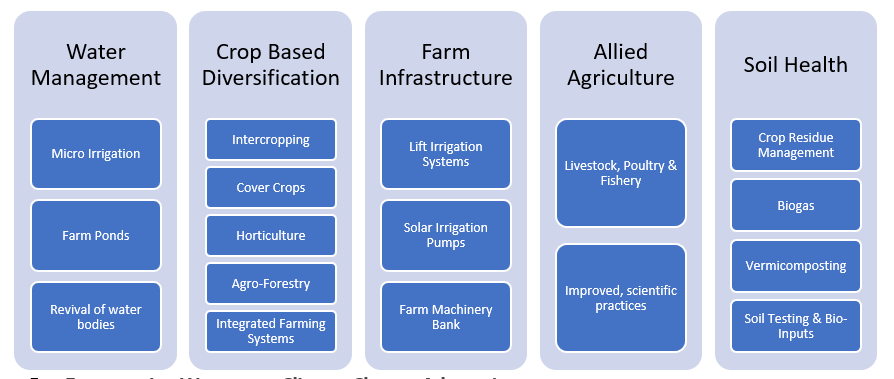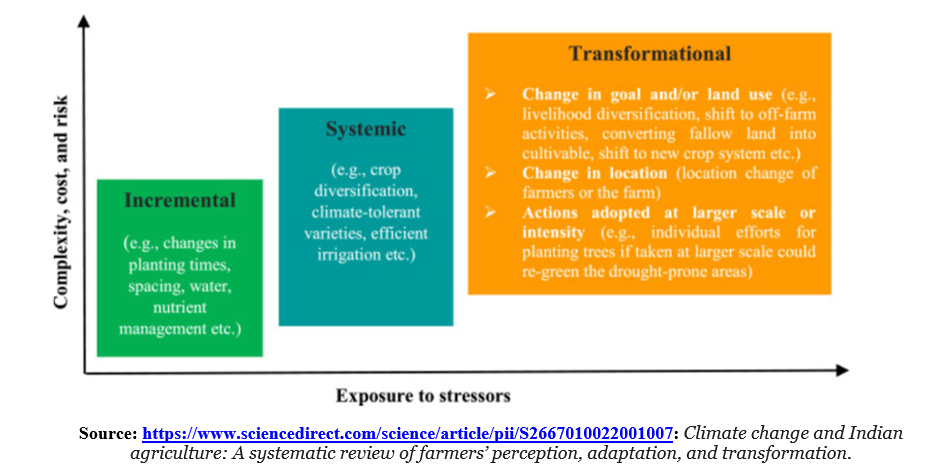Climate change is here. Beyond doing everything we can to slow the pace of global warming, there is a need to adapt to, so that we can protect ourselves, our livelihoods, and our communities. While the case for adaptation is clear, many communities who are most vulnerable to climate change are actually the least able to adapt - they are poor and in developing countries already struggling to provide the basics, like healthcare and education!
India is identified as one of the highly vulnerable countries to climate change. In particular, climate change poses serious risks to Indian agriculture as half of the agricultural land of the country is rainfed. It is a major concern, as 85 percent of farmers have low financial resilience.
In this context, farmers are at the ‘frontline of climate change’ and the ultimate practitioners of adaptation actions to mitigate the adversities on the food and fibre production system. So how is Ambuja Foundation enabling them with the knowledge and skills to adapt to the ‘new normal?’
1.Disseminating Knowledge: The perception of climatic changes has long been recognized as a pre-condition for adopting adaptation actions. Farmers who ‘perceive’ climate change and its detrimental effects are more likely to embrace policy initiatives to address it. Ambuja Foundation is actively disseminating continous knowledge through its capacity building programs be it in the form of seminars, expert talks, sharing climatic data patterns, technical trainings and demonstrations, so as to ensure that farmers are aware of the situation and its possible impacts.
2.Providing Support Mechanisms: Adaptation in agriculture sector means disseminating the knowledge on the negative impacts of climate change to reduce farmers' vulnerability by improving their adaptive capacity. But as with anything new, its tough to do it on your own! Ambuja Foundation is providing a variety of support systems to support farmers in this new journey – forming farmer learner groups & farmer producer organizations; guiding them to tap into government schemes and policies; and providing agricultural extension services and advice on the ground.
3.Enabling Technical Know-how & Investment: Unfortunately there are many barriers to adoption of adaptation measures. Technical knowhow is often lacking and Ambuja Foundation steps in to fill this gap and show farmers the way. Additionally, investment is often a huge hurdle for these already marginalised farmers. Whilst schemes are there, Ambuja Foundation helps farmers apply for subsidies, provides an additional supprt and helps farmers access credit where needed to invest also.
4.Rolling out Adaptation Strategies: Ambuja Foundation is actively promoting a vast range of adaptation technologies to support famers in adapting to, and preparing for, the new normal
5.Empowering Women on Climate Change Adaptation
In any extreme climatic condition (drought or flood) the ones who suffer most in a family is the women, especially in the vulnerable households. Ambuja Foundation is building their capacity to absorb shocks from climatic variability by institutional capacity, additional income from other than agriculture, market linkages and access to credit.
We promote SHGs and Women’s Federations, not only for saving and credit, but also to access the market for farm inputs, and for the sale of crop produce. We also increase their access to financial institution like bank and government schemes.
Ambuja Foundation is also working with women to build their capacity in key aspects of farming, like preparing homemade bio-inputs for pest and nutrient management, or livestock management with the aim to reduce the costs and increase the profits.
6.Leading Transformational Adaptation: Of course, adaptation measures come in a variety of shapes and forms. There are incremental, system and transformation changes that farmers can make to adapt to climate change.
Many Indian farmers have adopted a wide range of incremental and systemic measures – easier to digest for farmers due to their limited complexity, cost and risk. Ambuja Foundation however, is going one step further and promoting transformational adaptations in the form of substantial changes in land use, resource and labour allocations, occupational pattern, and cropping systems. Work in both Darlaghat (Himachal Pradesh) and Kodinar (Gujarat) have reached this level of transformation due to the almost 2 decades of collaboration and empowerment of farmers within these communities.
Given the scale of climate change, and the many areas of life it will impact, adaptation work needs to take place on a much greater scale to help the rural farmers become more resilient to climate impacts. This requires large-scale efforts. Large scale investors like NABARD, Better Cotton, HDFC bank, IDH, GIZ and other partners have stepped forward to help Ambuja Foundation scale up this important work. But as we all know, the need in India is vast, and we urgently need more stakeholders who can invest in this crucial area.
To explore partnership opportunities – reach out to Chandrakant Kumbhani (Chief Operating Officer) on chandrakant.kumbhani.ext@ambujafoundation.com




